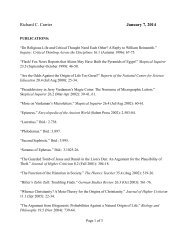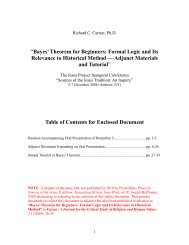Herod the Procurator - Richard Carrier
Herod the Procurator - Richard Carrier
Herod the Procurator - Richard Carrier
Create successful ePaper yourself
Turn your PDF publications into a flip-book with our unique Google optimized e-Paper software.
The procurator is particularly to be contrasted with <strong>the</strong> praefectus, or prefect, “one<br />
put in charge of.” This was primarily a military term, though of course in Augustan times<br />
<strong>the</strong>re was little distinction between <strong>the</strong> government’ s administration and <strong>the</strong> military (nor<br />
had <strong>the</strong>re ever been—<strong>the</strong> Roman state was fully militarized from as far back as records<br />
attest). 91 The office of prefect had a definite place in <strong>the</strong> Roman constitutional tradition,<br />
as an of ficer delegated by a magistrate to be his of ficial deputy, with real military and<br />
police authority, and sometimes even judicial authority . This post was ordinarily only<br />
held by Knights, and always military of ficers of non-Senatorial rank, and certainly never<br />
by freed slaves, who, as only partial citizens, would not have been legally eligible for <strong>the</strong><br />
delegation of imperium. Senators who were delegated authority by higher -ranking<br />
magistrates were granted <strong>the</strong> more prestigious title of legatus (“legate”), a general term<br />
usually entailing a propraetor or proconsul—if <strong>the</strong>y had achieved <strong>the</strong> relevant rank: i.e.<br />
any senator who had held <strong>the</strong> supreme post of consul (of <strong>the</strong> empire) was <strong>the</strong>reafter<br />
eligible to serve as proconsul, “on behalf of <strong>the</strong> consul,” whereas any senator who had<br />
only obtained <strong>the</strong> rank of praetor , or who was acting on behalf of a praetor , would serve<br />
as propraetor, “on behalf of a praetor .” Roman provinces were governed first and<br />
foremost at <strong>the</strong> end of a spear , for military power was synonymous with keeping order .<br />
Thus, when a province or regional command was too small to be governed by any of<br />
<strong>the</strong>se Senatorial legates or magistrates, it was governed by a prefect, a distinctly lower -<br />
class officer deputized to act in <strong>the</strong>ir name.<br />
The lines later blurred between prefects and procurators, hence many prefects in<br />
later sources are referred to, seemingly interchangeably , as procurators, and one possible<br />
reason for this is not hard to guess at. As <strong>the</strong> empire became more and more like an<br />
undisguised monarchy, and <strong>the</strong> public and private treasuries more and more blurred, <strong>the</strong><br />
power of procurators became more and more real—even when still informal, <strong>the</strong>ir<br />
authority could be hard to challenge. Disobeying a procurator surely became in due<br />
course synonymous with disobeying <strong>the</strong>ir employer—who happened to be <strong>the</strong> emperor ,<br />
and (as one might say) you didn’t take <strong>the</strong> emperor to court. So it would not be surprising<br />
if we found, well after <strong>the</strong> Julian period, imperial procurators sharing <strong>the</strong> emperor’s status<br />
in being above <strong>the</strong> law . That was a view of <strong>the</strong> emperor ’s legal status that was certainly<br />
post-Augustan. But <strong>the</strong>re is a more demonstrable reason for <strong>the</strong> lines to be blurred at this<br />
level of <strong>the</strong> Roman government: it was often practical to simply hire an existing prefect<br />
as a procurator , since his private role as financial agent of <strong>the</strong> emperor would <strong>the</strong>n be<br />
immediately backed up by his formal constitutional power as a prefect.<br />
We have evidence of this practice already in <strong>the</strong> Republic. As Jones puts it, “it<br />
was apparently not unusual for proconsuls to grant prefectures (including command of<br />
91 For <strong>the</strong> thoroughgoing militarization of <strong>the</strong> Roman Republic from its earliest days, where no real<br />
distinction existed between public administrators and military officers, see William V. Harris, War and<br />
Imperialism in Republican Rome: 327-70 B.C. (New York: Oxford University Press, 1979).<br />
32








